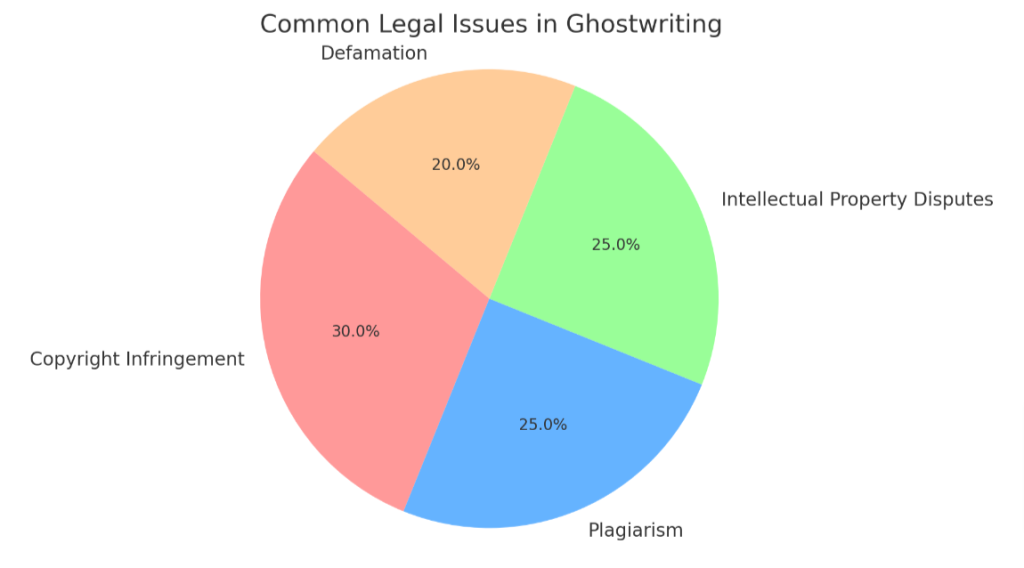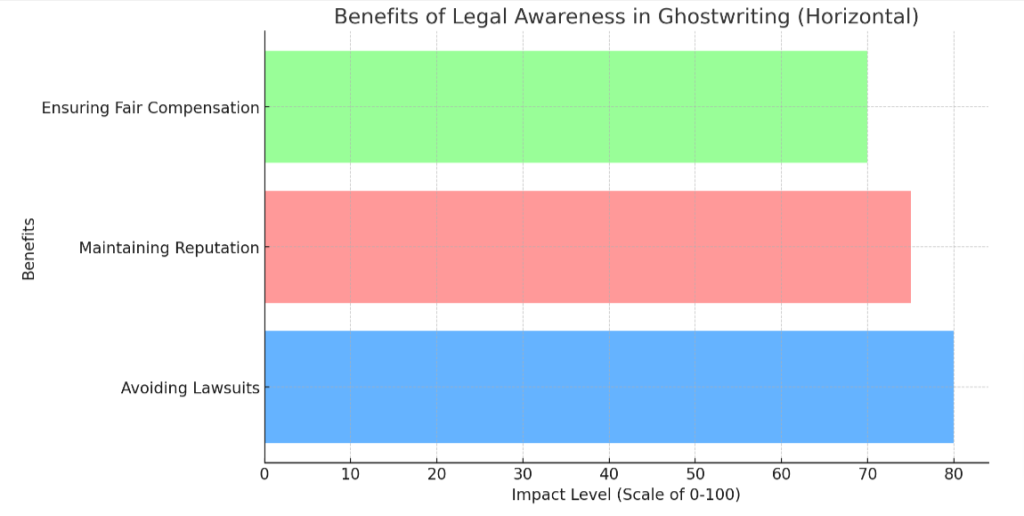Ghostwriting Guardrails: Navigating Legal Challenges Effectively
Ghostwriting can be a murky territory with potential legal potholes that are easy to stumble into. Did you know undisclosed ghostwriting could lead to accusations of plagiarism and copyright infringement? This blog will guide you through the labyrinth, highlighting key pitfalls and offering solutions to navigate them confidently.
Ready for some inside scoop? Let’s unravel this together!
Key Takeaways
- Ghostwriting can lead to legal issues such as plagiarism and copyright infringement.
- It is important to have a collaboration agreement that includes stipulations for intellectual property, payment terms, confidentiality, and dispute resolution.
- Both the writer and author have responsibilities and expectations in a ghostwriting collaboration.
- Careful vetting of professionals is necessary to protect your work from theft.
- Using real people in writing requires obtaining consent and respecting their rights.
- Adhering to court rules and legal standards ensures legal compliance and protects reputation in ghostwriting.
- Following professional conduct guidelines enhances trust, credibility, and long – term success in the industry.
Is Ghostwriting Legal?
Understanding the legal ramifications of ghostwriting and potential issues for both the writer and author.
Understanding the legal ramifications of ghostwriting
Ghostwriting blurs legal lines which can lead to complex issues. Copyright infringement is one such issue, occurring when a writer’s material gets used without their rightful credits.
Intellectual property rights remain a significant concern as the ghostwriter technically creates the work but may not own it legally. Misrepresentation also sneaks into the equation if an author claims written work they did not create.
In academia or journalism, undisclosed ghostwriting could be considered academic dishonesty or fraud respectively, leading to considerable consequences for all parties involved. Laws regarding these matters vary from region to region and it’s critical that both parties understand their rights before embarking on any project together.
Working with professionals who have comprehensive knowledge of copyright laws and drafting detailed contracts can curb many potential problems related to ghostwriting in future.
Potential issues for both the writer and author
Ghostwriting often stokes a slew of legal dilemmas that both the writer and author need to consider. Issues such as plagiarism, disputes over intellectual property rights, and ethical concerns are common in this field.
Copyright infringement can happen if ghostwriters unintentionally include someone else’s work in the content they write. This can lead to contentious legal proceedings not just for them, but also for their client – the author.
Similarly, problems arise when there’s ambiguity about who owns the finished work; it could result in contractual disputes between writers and authors. Ethical issues also surface when the true writer isn’t credited for their work, which amounts to misrepresentation on part of the disclosed authorship.
Lastly, defamation is a risk if real people or events described inaccurately wound up attracting lawsuits against either party involved in ghostwriting.
Protecting Yourself: Important Items to Include in a Collaboration Agreement
Include specific stipulations in the collaboration agreement to protect your work and rights, such as ownership of intellectual property, confidentiality clauses, payment terms, and dispute resolution mechanisms.
Stipulations to safeguard your work and rights
Ensuring your work and rights are protected is vital in ghostwriting. Here are some stipulations that you should consider:
- Clearly define the terms of intellectual property: The agreement should specify who owns the final draft.
- Establish payment conditions: Include clauses for installments, full payment, overages, and late fees.
- Include a confidentiality term: Both parties should agree to protect any shared sensitive information.
- Detail the scope of the project: Describe what tasks each party will undertake during collaboration.
- Specify revision requests: Clarify how many revisions one party can ask from another and at what cost.
- Set up an exit clause: If either party wants to back out, they should have a clear path without facing legal issues.
- Protect yourself with an indemnity clause: This helps shield you from legal actions resulting from the published work.
- Define dispute resolution mechanism: In case of disagreements, there should be a predefined mechanism for resolving conflicts professionally and legally.
- Spell out ownership of unused material: Any drafts or ideas not used in the final project should return to their original owner.
- Agree on attribution terms: Decide if and how the ghostwriter will receive public credit for his or her contribution.
Responsibilities and expectations of both parties
Both the writer and the author have certain responsibilities and expectations when engaging in a ghostwriting collaboration. Here is what you need to know:

1. Writer Responsibilities:
- Conduct thorough research to ensure accuracy and credibility.
- Adhere to project deadlines and deliver high – quality work.
- Maintain confidentiality and respect the author’s privacy.
- Communicate effectively with the author to understand their vision and goals.
2. Author Expectations:
- Clearly outline the scope of work, including desired writing style and tone.
- Provide necessary background information and resources to assist the writer.
- Review drafts promptly and provide constructive feedback for revisions.
- Honor agreed – upon payment terms in a timely manner.
3. Collaboration Agreement:
- Create a comprehensive contract that specifies rights, ownership, and compensation.
- Include provisions for copyright protection, plagiarism prevention, and non – disclosure agreements.
- Clarify expectations regarding revisions, final approval, and termination of the collaboration.
4. Effective Communication:
- Maintain open lines of communication throughout the process through regular check – ins.
- Address any concerns or conflicts promptly in a professional manner.
- Use clear written or verbal instructions for tasks or changes required.
5. Professionalism:
- Uphold ethical standards by avoiding misrepresentation or making false claims on behalf of the author.
- Respect intellectual property rights by properly attributing sources used in the writing.
- Seek legal advice if uncertain about copyright issues or potential liabilities.
Avoiding Legal Issues: Tips for Working with Other Professionals
Maintain trust and protect your work from theft by carefully vetting any other professionals you collaborate with in the ghostwriting process.
Maintaining trust and protecting your work from theft
To maintain trust and protect your work from theft in the world of ghostwriting, it is crucial to establish clear boundaries and safeguards. You can start by signing a comprehensive collaboration agreement that outlines the specific stipulations designed to safeguard your work and rights.
This agreement should clearly state responsibilities and expectations for both parties involved. Additionally, it is important to be cautious when working with other professionals by thoroughly vetting their reputation and credibility before entering into any agreements.
By taking these steps, you can ensure that your work remains secure while upholding trust throughout the ghostwriting process.
Understanding the implications of using real people in your writing
Using real people in your writing can have significant implications. It’s crucial to consider legal and ethical aspects when incorporating their stories or experiences into your work.
By doing so, you need to ensure that you have obtained proper consent from the individuals involved and protect their privacy rights. Failure to do so could result in potential defamation risks or even a breach of intellectual property rights.
Furthermore, misrepresenting or manipulating someone’s story can lead to ethical concerns and damage your reputation as a writer. Therefore, it is essential to approach the use of real people in your writing with care and respect for their rights and expectations.
Ensuring Legal Compliance: Ethical and Professional Conduct in Ghostwriting
Ghostwriters must adhere to court rules and legal standards while maintaining a professional code of conduct, as this not only ensures legal compliance but also protects their reputation.
The importance of following court rules and legal standards
Following court rules and legal standards is of utmost importance in the field of ghostwriting. By adhering to these regulations, ghostwriters can ensure that their work is legally compliant and avoids any potential legal issues or repercussions.
Court rules and legal standards provide a framework for ethical conduct, protecting both the writer and author involved in the collaboration. Additionally, maintaining compliance with these guidelines helps enhance the reputation of the ghostwriter, showcasing their professionalism and commitment to upholding legal integrity within their work.
The impact of professional conduct on your reputation
Maintaining professional conduct is crucial in the world of ghostwriting as it directly affects your reputation. By conducting yourself ethically and responsibly, you can establish trust with clients and colleagues alike.
Upholding court rules and legal standards ensures that your work is seen as credible, reliable, and trustworthy. Adhering to professional conduct guidelines not only safeguards against potential legal issues but also enhances your reputation as a reputable ghostwriter who values integrity.
Remember, by consistently demonstrating ethical behavior, you build a solid foundation for long-term success in the industry.

Conclusion
In conclusion, ghostwriting can come with a range of legal pitfalls that both writers and authors need to be aware of. To protect yourself, it’s important to have a strong collaboration agreement in place that outlines the responsibilities and expectations of both parties.
Additionally, maintaining trust and adhering to ethical standards in your work is crucial for avoiding potential legal issues.

